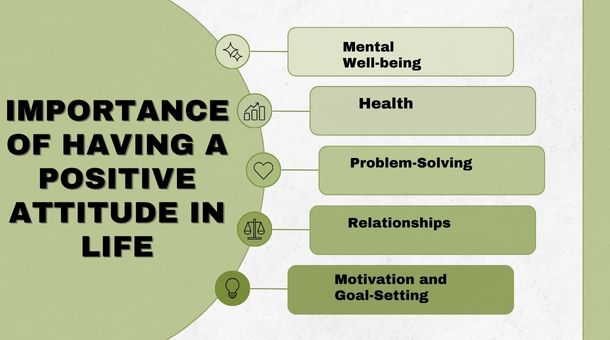What:
This article explains the importance of positive thinking in daily life.
Why:
This article aims to illuminate the deep influence of cheerful perspectives on mental resilience, overall well-being, and life satisfaction.
our world is full of challenges, and understanding the profound impact of positive thinking on our lives becomes more difficult.
In this article, I will explain the importance of a positive mindset and its effects on human mental and physical health, and overall success.
Explore the science behind the benefits, learn practical strategies for positivity, and discover the transformative potential of embracing in your daily life.
Join me, to learn more about the psychology behind the power of positive thinking and how a positive mindset can help reduce your stress and improve your physical health.
What is positive thinking?
Positive thinking is a mental attitude characterized by an optimistic and constructive approach to explaining events, situations, and the overall images of life.
It involves maintaining a positive mindset, focusing on favorable situations, and expecting positive outcomes. Positive thinkers tend to see challenges as opportunities for growth, temporary setbacks, and success achievable through effort and patience.
Why positive thinking IS important?
Importance of having a positive attitude in life:

1: Human Mentality:
- Stress Reduction: Positive thinking helps you to reduce stress levels by focusing on solutions rather than dwelling on problems.
- Anxiety Management: positive attitudes help to lower anxiety levels, promoting a peaceful mental state.
- Emotional Resilience: A positive thinker provides better solutions to handle setbacks and develops emotional strength while facing challenges.
2: Health:
- Enhanced Immune System: According to research a positive thinker has a stronger immune system and better physical health.
- Lower Risk of Chronic Diseases: They are more strong and healthy lifestyles so the risk of chronic disease is less than others.
3: Problem-Solving:
- Solution-Oriented Approach: Positive thinkers have the ability to solve problems with a constructive and solution-oriented mindset.
4: Relationships:
- Positive Interactions: A positive thinker has the ability to create a strong and more enjoyable atmosphere in social interactions.
- Conflict Resolution: Positive thinking facilitates better communication and conflict resolution, strengthening relationships.
5: Motivation and Goal-Setting:
- Increased Motivation: Positive attitudes fuel motivation, inspiring person to pursue and achieve their goals with determination.
- Resilience in Pursuit of Goals: When faced with obstacles, positive thinkers are more likely to persevere and stay committed to their aspirations.
6: Life Satisfaction:
- Gratitude and Appreciation: Positive thinker encourages with attitude and appreciation for life’s blessings, contributing to an overall sense of fulfillment.
- Optimistic Outlook: Those who think positively tend to perceive life with a more optimistic lens, leading to increased life satisfaction.
How Does Positive Thinking Contribute to Success and Achievement?
Positive thinking plays an important role in success and achievement across various aspects of our lives.
One of the important ways it contributes to success is by shaping an human mindset and outlook toward challenges. positive person tend to view obstacles as opportunities for growth rather than imposible barriers.
This mindset shift enables us to approach problems with creativity, resilience, and a solution-oriented mindset.
Moreover, positive thinking enhances motivation and perseverance. When individuals believe in their abilities and maintain a positive outlook, they are more likely to stay focused on their goals, overcome setbacks, and persist in the face of adversity. This unwavering determination becomes a driving force propelling them toward success.
Positive thinking also influences interpersonal relationships and collaboration, which are often integral to achieving success.
Hopeful individuals tend to inspire and uplift those around them, fostering a positive and productive environment.
This positive social influence can lead to stronger teamwork, effective communication, and the creation of a supportive network that facilitates the pursuit of common goals.
Positivity radiates confidence, making individuals more approachable and increasing their chances of networking and forming beneficial connections. This, in turn, can create a ripple effect, presenting new avenues for success and achievement.
10 Strategies that Can Help Foster a Positive Mindset in Everyday Life:
Promoting a positive mindset is a transformative journey that involves adopting different strategies to cultivate hopefulness in our daily lives.
Here we mention 10 effective strategies that Can Help you to promote a Positive Mindset in your daily Life:
1. Practice Gratitude:
Regularly express gratitude for the positive aspects of your life. Keeping a gratitude journal or taking a moment each day to reflect on things you are thankful for can shift your focus toward the positive.
2. Positive Affirmations:
Incorporate positive promise into your daily routine. Speak words of encouragement and positivity to yourself, and support a constructive self-image and positive mindset.
3. Surround Yourself with Positivity:
You engage with people who give you positivity and support. Positive social interactions can significantly impact your opinion, promoting an environment that is useful for your positive attitude.
4. Mindfulness and Meditation:
Cultivate mindfulness through practices like meditation. Being present at the moment and clearing your mind of negativity can contribute to a more positive and balanced your mental state.
5. Challenge Negative Thoughts:
you can challenge and reframe negative thoughts. When faced with difficulty, try to find alternative points of view and focus on potential solutions rather than dwelling on problems.
6. Focus on Solutions:
solve the problems, and encourage your power to find solutions. A problem-solving approach can empower you and promote a strength to control challenging situations.
7. Set Realistic Goals:
set up your goals and celebrate small successes along the way. Setting and achieving realistic objectives can boost your confidence and contribute to a positive mindset.
8. Engage in Activities You Enjoy:
Participate in activities that bring joy and success to you. Whether it’s a hobby or exercise you must spend time with loved ones. engaging in positive experiences can contribute to a confident way of thinking.
9. Limit Exposure to Negativity:
Be careful of the things you consume, whether it’s news, social media, or conversations. Limit exposure to negativity, find sources of success, and boost positivity in your life.
10. Learn from Challenges:
for your personal growth, you have to face challenges. Accepting these challenges as part of the journey can help a positive attitude in your life.
Conclusion
In this complete article, we discuss how the journey towards positive thinking is a continuous and difficult process, but the rewards are profound—an enriched quality of life, and a strong ability to navigate challenges, are important for your personal and professional success.
FAQ:
Why is positive thinking important for students?
In addition to motivation, a positive mindset can also lead to improved self-esteem and confidence. When students believe in themselves and their abilities, they are more likely to take risks and try new things. This can lead to increased creativity and innovation, as well as greater academic achievement.
What are 5 positive attitudes?
- Resilience. In positive psychology, resilience is being able to recover from stressful and challenging life events. …
- Courage. …
- Optimism. …
- Gratitude. …
- Acceptance. …
- Changing your perspective. …
- Smiling and being kind to others. …
- Practicing self-compassion.
What is an example of a positive thought?
Here are some examples of future-focused positive thoughts: “It’s all going to turn out fine.” “I can’t wait to go to that event next week.” “I will continue to work toward my goals, so I know that my future is going to be great.
Why is it hard to be positive?
If you’ve tried thinking positively, you know that it can be a difficult habit to maintain. You may spend five, ten, or even twenty minutes reciting an affirmation, but the other 23 hours of the day? Chances are that your mind drifts back to old, repetitive thoughts that have burned deep grooves in your brain.
Why Positive Thinking IS Important? Why Positive Thinking IS Important? Why Positive Thinking IS Important?Why Positive Thinking IS Important?Why Positive Thinking IS Important? Why Positive Thinking IS Important?









